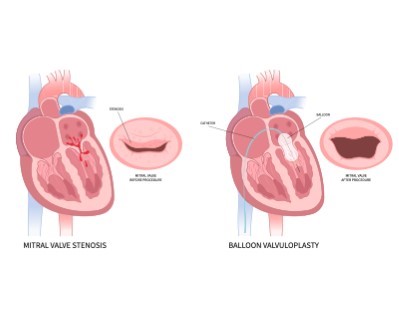Mitral Balloon Valvuloplasty
- Purpose: Treats mitral valve stenosis by widening the mitral valve opening.
- Procedure: A balloon catheter is inserted into the mitral valve and inflated to stretch the valve.
-
Note: The information provided here applies to elective Mitral Balloon Valvuloplasty procedures without extraordinary circumstances. However, specifics may vary based on individual patient factors, such as the severity of mitral valve stenosis, the presence of other heart conditions, or complications that might arise during the procedure. In some cases, additional interventions or the patient’s overall health could influence the procedure and recovery process.
Inpatient/Outpatient
Mitral Balloon Valvuloplasty is typically performed as an inpatient procedure. This approach allows for close monitoring of the patient before, during, and after the procedure to ensure that the mitral valve is properly opened and that the patient's heart function remains stable. Most patients will require at least one night in the hospital for observation and recovery.Hospital Stay Duration
Patients undergoing Mitral Balloon Valvuloplasty usually stay in the hospital for 1 to 2 days. This hospital stay ensures that the procedure was successful and that there are no immediate complications, such as valve regurgitation, bleeding, or arrhythmias. Patients with more complex conditions may require a longer stay for additional monitoring.Type of Anesthesia
The procedure is generally performed under local anesthesia with sedation, which helps the patient remain comfortable and relaxed during the procedure. In some cases, general anesthesia may be used, especially if the patient has other medical conditions that make sedation alone insufficient or if the procedure is expected to be more complex.Travel After Procedure
Patients are typically advised to avoid travel for at least a few days after the procedure, particularly long-distance or air travel, to ensure that they are stable and to allow time for any immediate recovery needs. It’s important to follow the healthcare provider’s specific recommendations regarding travel and activity post-procedure.Pre-procedure Preparation
Prior to the procedure, patients are usually instructed to fast for several hours. They may also need to temporarily adjust or stop taking certain medications, especially blood thinners, under the guidance of their healthcare provider to minimize the risk of bleeding during the procedure. Specific pre-procedure tests and imaging may also be required to plan the procedure effectively.Procedure Duration
Mitral Balloon Valvuloplasty typically takes about 1 to 2 hours to complete, although the total time may vary depending on the complexity of the stenosis and the patient’s overall condition.Recovery Time
Most patients can expect to return to light activities within a week, though full recovery, including the resumption of more strenuous activities, may take several weeks. Patients should follow their healthcare provider’s instructions regarding activity levels and any necessary lifestyle adjustments post-procedure.Estimated Cost
The cost of Mitral Balloon Valvuloplasty can vary widely depending on the hospital, geographic location, and the specifics of the patient’s condition. For detailed cost information, patients should contact their healthcare provider or the hospital directly.Post-procedure Care
Post-procedure care involves monitoring the patient for signs of complications, such as valve leakage or arrhythmias. Patients will also need to manage the incision site (if applicable) and attend follow-up appointments to assess the success of the procedure and discuss any further treatment or lifestyle changes. Regular follow-ups are essential to monitor heart function and ensure the long-term success of the procedure.

